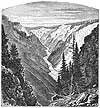What did the English do after the attack on April 17, 1644 failed? Treaties made with Opechancanogh's successor, Necotowance, severely restricted the territory of the Powhatan people by confining them to small reservations. The treaty of October 1677 established an annual tribute of twenty beaver skins to be paid to the colonists. The English also claimed the right to appoint Necotowance'ssuccessors. This treaty made the English the sole owners of the Lower Peninsula between the James and the York Rivers. TheSettlement Lawgave the Powhatans freedom to inhabit land north of the York River, but it did not restrict the English from also settling there. The English were free to expand after notifying Necotowance, or his successor, of their intentions. An agreement was made among the English to wait until after the Powhatans had forgotten the recent wars before moving northward. The incident that sparked Bacon's Rebellion began with the Doegs. The Doegs were nottributaryPowhatans, but had held a grudge against the English since 1658. A dispute over money with Thomas Mathew had left Mathew's herdsman, Robert Hen, dead, and the Doegs fled toward Maryland. Virginia militiamen followed them and killed several of the Doegs as well as several innocent Susquehannocks. Nathaniel Bacon, Jr. became the leader of avigilantegroup whose intention was to battle the Indian threat and fight any Englishmen who got in the way.
 |
| Scene of the Upper Potomac |
The General Assembly met in June of 1676 and passed laws reflecting the sentiments of the vigilante group. Some of those laws included:
- Declaring all Indians who deserted their towns or who harbored hostile Indians as enemies; all trade with Indians was prohibited
- Any Indians captured in war were to be slaves
- "Friendly" Indians were free to hunt with bow and arrows only - no firearms were allowed
- Land deserted by any of the Indian people would be sold to pay the expenses of a general Indian war
The rebellion subsided after the Bacon's death in October 1676. In 1677, the three commissioners sent by King Charles to investigate the cause of the rebellion found clear evidence that the Powhatans had been attacked and dishonored without reason. Philip Ludwell, the colony's secretary, wrote "While the Indians had liberty to sell theire lands the English would ordinarily either frighten or delude them into a bargaine and for a trifle get away the grownd they should live on, then he comes and settles himselfe there and with his cattle and hoggs destroyes all the corne of the other Indians of the towne. This fills us with complaints and will if not prevented keep out peace forever uncertaine... This was a great cause of this last warr, and most of those who had thus intruded and were consequently the prinicpall cause of it were notwithstanding amongst the forwardest in the rebellion and complained most of grievances."
|

